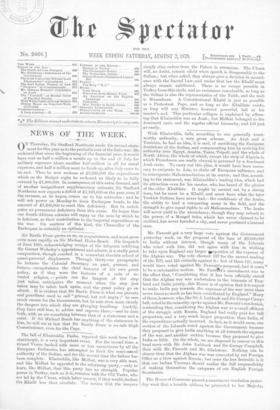Mr. Fawcett got a very large vote against the Government
yesterday week, on the proposal et the loan of £2,000,000 to India without interest, though many of the Liberals who voted with him, did not agree with him in wishing to take upon England any larger froportion of the expense of the Afghan war. The vote showed 137 for the second reading of the Bill, and 125 virtually against it; but of these 125, many would have voted against Mr. Fawcett's proposal, had it come to be a substantive motion. Mr. FawAt's amendment was to the effect that, "Considering that it has been officially stated that the Afghan war was undertaken in the interests of Eng- land and India jointly, this House is of opinion that it is unjust to make India pay towards the expenses of the war more than seven times as much as has been contributed by England." Many of those, however, who,like Sir J. Lubbock and Sir George Camp- bell, voted in the minority, spoke against Mr. Fawcett's resolution, contending that, considering the Afghan war as a small offshoot of the struggle with Russia, England had really paid her full proportion, and a very much larger proportion than India, of the expenditure actually incurred. Iu fact, as it would seem, one section of the Liberals voted against the Government because they proposed to give India anything at all towards the expense of the war, and another section because they proposed to give India so little. On the whole, we are disposed to concur on this head more with Sir John Lubbock and Sir George Campbell, than with Mr. Fawcett and Mr. Gladstone. Nothing can be clearer than that the Afghan war was concocted by our Foreign Office as a blow against Russia; but none the less desirable is it that our Indian Viceroys should realise the full responsibility of making themselves the catspaws of our English Foreign Secretaries.


































